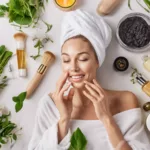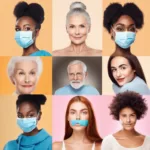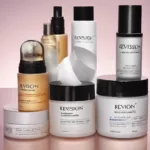13 December 2023
Gen-Z is increasingly concerned about aging and is adopting anti-aging beauty practices at a young age, leading to a surge in demand for preventive skincare and cosmetic procedures.
As the oldest members of Generation Z approach their mid-20s, they are experiencing a newfound anxiety about aging. Influencer Emma Brooks, at the age of 20, began to worry about how she would look in the future. This fear of aging is not unique to Brooks; Gen-Z is increasingly focused on prevention rather than correction when it comes to their skincare routines. They are incorporating makeup products with anti-aging benefits and using anti-aging serums daily. Botox start-up Peachy has even reported that Gen-Z is its fastest-growing customer base. This trend has been amplified by social media platforms like TikTok and Instagram, where young adults share their routines and seek advice on “preventative aging.” This article explores the reasons behind Gen-Z’s obsession with preventative aging, the impact of social media, and the implications for the beauty industry.
1: The Influence of Social Media on Gen-Z’s Perception of Aging
Gen-Z spends more time than ever looking at their own faces due to platforms like Instagram, TikTok, and Zoom. This constant self-reflection has led to an increased awareness of their appearance and a desire to prevent signs of aging. Young adults share their skincare routines, which often include retinoids, vitamin C, and sunscreen, as well as unconventional methods like face tape and “baby botox.” The popularity of these routines has led to a significant increase in searches and social buzz surrounding botox, dermal fillers, and retinol. The retail intelligence platform Trendalytics reports a 63% increase in interest in these products this year.
2: Gen-Z’s Wellness-Centric Approach to Anti-Aging
Unlike previous generations, Gen-Z views anti-aging as a wellness practice rather than a purely cosmetic concern. They are hyper-aware of skincare, the aging process, and environmental stressors. Dylan Heberle, a 26-year-old consultant, sees his skincare routine as tied to health and prioritizes sunscreen to prevent skin cancer. This wellness-centric approach aligns with the rise of all-encompassing self-care and the trend of taking better care of oneself. Gen-Z’s focus on prevention has led to a rebranding of anti-aging as a wellness practice rather than a purely cosmetic one.
3: Brands Respond to Gen-Z’s Demand for Preventative Aging Products
Brands have recognized the demand for anti-aging products among Gen-Z and are creating more options to meet their needs. The volume of skincare and beauty products referencing anti-aging has increased by 10% in the past two years, according to Trendalytics. Searches for sunscreen have tripled, and there are now three times as many sunscreen products on the market compared to three years ago. Beauty brands specifically tailored to young skin are also emerging, offering products that cater to the unique needs of Gen-Z. E.l.f Beauty, for example, launched a retinoid last year, and Bubble introduced an eye cream in November.
4: The Rise of Preventative Aging Procedures Among Gen-Z
Gen-Z’s desire for immediate results has led to an increase in the popularity of injectables like Botox among young adults. Botox, once primarily associated with older individuals, is now seen as a more effective and cost-efficient alternative to fine line-erasing products. Facial plastic surgeon Paul Nassif has observed a growing number of younger individuals seeking peels, facials, and laser treatments. Gen-Z’s obsession with filters and perfection has contributed to their willingness to undergo cosmetic procedures at a younger age.
5: The Impact of Social Media on Gen-Z’s Perception of Aging
Social media plays a significant role in shaping Gen-Z’s perception of aging. Hashtags like #antiaging have billions of views on platforms like TikTok, and viral trends like the aged filter have further fueled interest in anti-aging treatments. Gen-Z’s openness on social media has also helped spread awareness and demand for these treatments. They share their experiences with injections, often filming the process or creating timelapse videos to showcase the results. However, the abundance of information on social media can also be overwhelming and lead to confusion and anxiety for a generation still navigating their way through life.
Conclusion: Gen-Z’s obsession with preventative aging is driven by their increased self-awareness, social media influence, and desire for immediate results. This has created a significant opportunity for beauty brands to tap into a consumer base they historically haven’t considered. However, it remains to be seen how Gen-Z’s preferences will evolve as they grow older. The wellness-centric approach to anti-aging and the emphasis on prevention rather than correction are likely to shape the future of the beauty industry. As Gen-Z continues to navigate the complexities of aging in the digital age, brands and consumers alike must find a balance between body positivity and the fear of aging.



